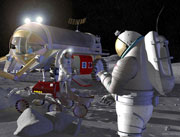 Ja, deze aankondiging laat het hart van elke rechtgeaarde sciencefiction-liefhebber sneller kloppen.
Ja, deze aankondiging laat het hart van elke rechtgeaarde sciencefiction-liefhebber sneller kloppen.NASA wil tegen het jaar 2024 een basis bouwen op de maan! Hoe cool is dat? Hier de uitleg van NASA.
Ik heb het altijd onbevredigend gevonden dat het ruimteprogramma feitelijk werd stopgezet na een aantal bezoekjes aan de maan. We kunnen als mensen naar de ruimte, laten we het dan doen ook! Er is nog zoveel te ontdekken: Mars, Venus, Jupiter, Neptunus... (Dat laatste was een verwijzing naar mijn eigen SF-boek. Ja, ik ging er daarin vanuit dat de mensheid in het begin van deze eeuw wel op Mars zou landen.)
Nu is er eindelijk progressie. Een permanente maanbasis. Eindelijk gaan we andere werelden koloniseren.
 De kans dat menselijke bewoning op Mars mogelijk is, werd deze week een stuk groter door de ontdekking van stromend water op Mars. Op foto's van hetzelfde stuk Marsoppervlak, genomen met zes jaar verschil, zijn nu geulen en afzettingen zichtbaar die er eerst niet waren. Dat betekent dat er vloeibaar water over het oppervlak van Mars heeft gestroomd. Dat heeft twee consequenties: ten eerste dat een eventuele Marsexpeditie niet van dorst hoeft om te komen (en water kan weer worden omgezet in zuurstof en waterstof: lucht om te ademen en brandstof voor voertuigen). Ten twee betekent de ontdekking van vloeibaar water op Mars dat er een reeële kans is op het bestaan van leven. Hier op Aarde komt er overal waar water is leven voor. Op Mars misschien ook wel.
De kans dat menselijke bewoning op Mars mogelijk is, werd deze week een stuk groter door de ontdekking van stromend water op Mars. Op foto's van hetzelfde stuk Marsoppervlak, genomen met zes jaar verschil, zijn nu geulen en afzettingen zichtbaar die er eerst niet waren. Dat betekent dat er vloeibaar water over het oppervlak van Mars heeft gestroomd. Dat heeft twee consequenties: ten eerste dat een eventuele Marsexpeditie niet van dorst hoeft om te komen (en water kan weer worden omgezet in zuurstof en waterstof: lucht om te ademen en brandstof voor voertuigen). Ten twee betekent de ontdekking van vloeibaar water op Mars dat er een reeële kans is op het bestaan van leven. Hier op Aarde komt er overal waar water is leven voor. Op Mars misschien ook wel.Ik kan de liedtekst nu niet meer vinden, maar wij zongen vroeger thuis een lied dat zei 'Gods kinderen maken eenmaal kosteloos een ruimtevaart, langs sterren en planeten achter onze heiland aan'. Ik vond dat een prachtig lied! Het wekte verlangen in me op. Nee, ik geloof niet dat de hemel een letterlijke plek in het heelal is, waar we naartoe zullen reizen langs sterren en planeten. Maar ik geloof wel dat we dan met eigen ogen alle wonderen van het heelal zullen zien: de kraters op de Maan, de ravijnen op Mars en de hoogste berg van het zonnestelsel, de kilometers diepe oceaan op de maan Europa, de rode vlek op Jupiter, de methaanatmosfeer van Titan, de ringen van Saturnus...
Wauw! Het vooruitzicht doet me watertanden...
[Yes, this anouncement will make every real fan of science fiction happy. NASA wants to establish a permanent moonbase by the year 2024. How cool is that? Here the explanation by NASA.
I've always been disappointed by the decision to end the space program (in any real sense of exploration) after a couple of visits to the moon. We as humans now have the technology to travel to space. Well, let's do it! There's so much left to explore: Mars, Venus, Jupiter, Neptune... (The last was an allusion to my own SF-novel. Yes, I wrote how we would colonize Mars at the beginning of this century.)
Now at last there's progression. A permanent moonbase. At last we will colonize other worlds.
The chance of permanent human inhabitation of Mars being possible grew this week by the discovery of fluid water on the surface of Mars. Pictures of the same part of the surface of Mars, made with a six-year interval, now show gullies and deposits not visible before. That means that water has flowed on the surface of Mars. There's two consequences to that. The first is that an expedition to Mars will not have to grow thirsty (and water can be changed to oxygen and hydrogen. both very important). Secondly the discovery of fluid water means there's a real possibility of finding life. Here on earth everywere where there's water we find life. Maybe the same holds true for Mars.
I can't remember all the words (and can't find it on google), but when I was young we sang a song that went: 'Gods children will one day travel space for free, passing stars and planets, following the savior'. It was my favorite song! It created desire in my heart. No, I do not believe heaven to be a literal place in our universe, where we can come by passing stars and planets. But I do believe we will at that time see all the wonders of the universe with our own eyes: the craters on the Moon, the ravines of Mars and the largest mountain in our solar system, the deep ocean of Europa, the red spot of Jupiter, the methane atmosphere of Titan, the rings of Saturn...
Whoa! I'm already salivating by the prospect...]

No comments:
Post a Comment